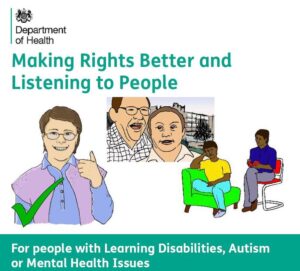We may all have different health and care needs and circumstances but we all have the same right to dignity, respect and choice. This is the guiding principle driving one of our latest engagement pieces, ‘No voice unheard, no right ignored: a consultation for people with learning disabilities, autism and mental health conditions’. The goal is to further strengthen rights and representation for those needing support from the health and care sector to live well in the community.

In a way, it’s a shame we still have to spell this out in the 21st century, but if stigma, ignorance and institutional bias remain, then we are duty bound to eliminate it. All people with disabilities, mental or physical, should have access to the same life and career opportunities as anyone else. A person’s perceived impairments make them no less worthy of respect and their rights no less important than others – and that includes friends, families and carers.
This consultation sets out some pertinent questions around how we can make services ‘hardwired’ to see a person’s potential – not just be limited to a narrow focus on conditions. We want this exercise to address and find solutions for those people who feel let down or ignored by the system, of being isolated from friends and family, of being cast adrift without the right support in their communities. The proposed measures set out in this document place a clear emphasis on personal independence, choice and community provision. In summary, we are consulting on:
- Putting people in charge of their life, supported by family and friends - not treating them as passive recipients of decisions about their care. The consultation proposes a named professional in charge of sharing information with individuals, families or carers, including their right to challenge care decisions.
- Strengthening the challenges in the system to people being sent to hospital - making it much harder to admit people to institutions by default and offering better support in the community.
- Helping people live independently and be part of their communities. The consultation asks for views on a specific duty for local authorities and clinical commissioning groups to think about how to ensure there is enough community based support and treatment services.
- Making sure people receive the right care in the right place by putting their needs at the heart of the decision making process.
- Giving very clear accountability and responsibility throughout the system so there can be no excuse for people falling through the gaps between services.
- Whether there should be changes to the Mental Health Act in the way it applies to people with learning disabilities and autism.
To help drive this change the consultation also proposes a model of shared funding to help people leave hospital sooner or prevent them from being admitted in the first place. It also posits an expansion of the right to personal health budgets for more people with learning disabilities or autism.
As you’d expect, I take a keen interest in what local authorities and commissioners can do to better equip local markets and improve provision of – and access to – services, framed by an individual’s right to expect appropriate care. This means mapping of local providers, in depth analysis of local needs, and proper patient assessments to avoid unnecessary hospital admissions. As ever, education, oversight and early intervention are the watch words.
As many of you will be aware, the Care Act places new duties on local authorities from April this year intended to promote efficient and effective local markets for adult social care and support. Diversity and quality of care are paramount. To achieve this will require even greater levels of collaboration between relevant local partners. The views of those needing care, their families and carers must also be part of any procurement process.
I’m also keen to understand what more we can do to strengthen advocacy and safeguarding for those unable to articulate their care needs and concerns. Lyn Romeo, our Chief Social Worker for Adults has already spoken in her blog about the need to speak up for vulnerable people. As such, this consultation dovetails with the recently revised Mental Health Act Code of Practice and her own recently published knowledge and skills statement, which seeks to equip social workers to be even more alert and present in helping individuals make their own care and life decisions.
This consultation is about empowerment and respect, so please respect the rights of those it is intended to serve and share your insights. No voice unheard – no submission ignored!
The consultation is open until 29 May 2015
